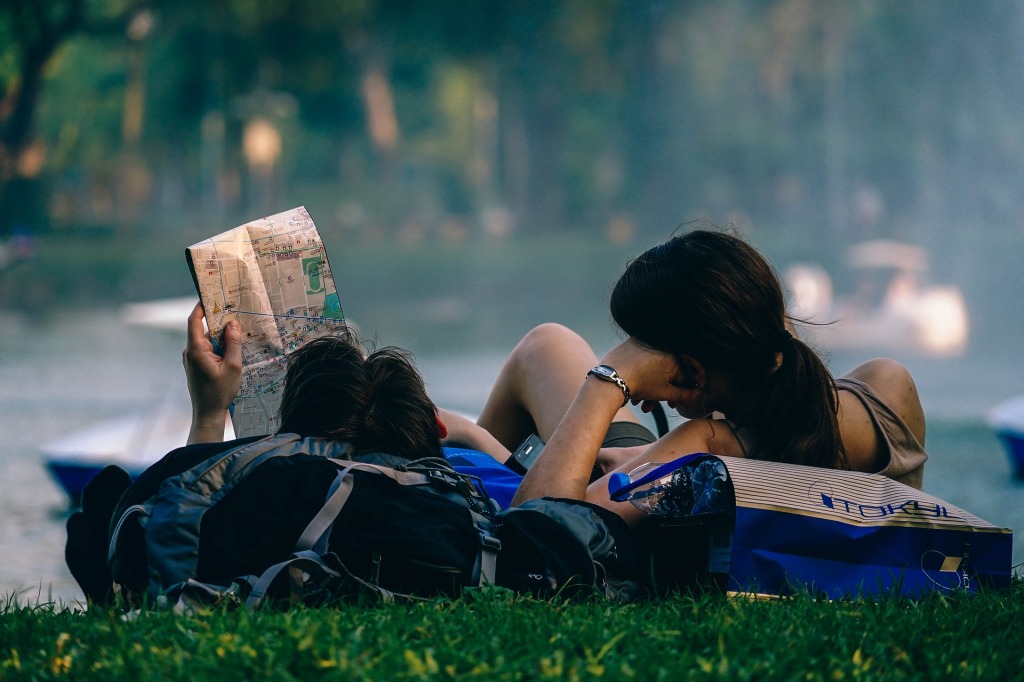
Whether you’re going for a couple of weeks or even for months together, there are some foundational things that are critical to making travel with someone else successful. Ashlea Halpern is an editor at Traveler magazine who recently spent a year globetrotting with her boyfriend. Here are some of her best tips for making it work so you can come back from your journey stronger than ever.
Get clear on what you’re good at and what you’re not good at — and play up each other’s strengths. You might be awesome at small details, or you might be more of a big-picture kind of person. Either one is fine, of course — but be honest with yourself about where you excel. Use your gifts to help make the trip better, and let your travel partner do the same. If you hate navigating and you’re no good at it, then don’t insist on being the one to find the hotel at 11pm in a city of ten million people. Find another way to get that done. When you see yourself and your companion get more done when you balance each other out, then differences don’t have to be catastrophic.
Go ahead and step out of your comfort zone, but be clear about your boundaries. Yes, traveling is all about expanding and learning, and it’s good to try all kinds of new things. But don’t be afraid to set limits. If you absolutely do not want to go skydiving, don’t do it — but if it’s someone else’s dream, offer to be there cheering her on. If you really want to try roasted beetles, go for it! But if your friend refuses, respect that and move on. There are plenty more adventures ahead to enjoy together.
Find small certainties within the chaos. So much of travel is uncertain — you’re in a new place, surrounded by things you might not recognize, trying to navigate through language and cultural barriers. If you’re traveling long-term, you know the agony and exhaustion of flight changes, train schedules, taxi rules, late nights, early mornings. Fatigue can make you vulnerable to illness, impatience, and arguments. Take an honest look at yourself and identify one or two things you need to do every day to keep you grounded. Is it a good breakfast? A great cup of coffee? A reasonable bedtime? An afternoon walk? Time with a good book? Then, to the best of your ability, try to honor those needs, even when everything is up in the air. Compromise with your travel partner — if he’s an early riser and you’re a sleeper-inner, find a way to meet in the middle, or try to accommodate those natural tendencies. Maybe he gets up at six and reads the paper or works out while you snooze for an extra hour. These small concessions will pay huge dividends later on when the time comes where you have to make sacrifices due to schedules or other needs.
It’s okay to spend time apart. Especially if you’re an introvert, you might need alone time to stay sane. Or you might just want to spend an afternoon exploring on your own, talking to new people, doing different things. It’s okay! It’s normal to get sick of spending weeks at time in close quarters with the same person. A little pre-planned, cordial time apart might be the exact thing that helps you be at your best together.
When things get tough, stand together. It’s normal to bicker about small things. Everyone does. But when there’s something major, remember that you are a team. Hold off on blame, engage empathy, and get to work — together.
Don’t forget to be silly. Laughter has saved many a relationship. It brings us back to what matters. It helps us take ourselves less seriously. It reminds us that it’s more important to be connected than it is to be right. Recognize when your travel partner is trying to lighten the mood, and don’t be afraid to let go and be goofy together. That time when everything was going wrong, and you stopped and realized how ridiculous it all was, and you laughed so hard that you both had tears rolling down your cheeks — that will stay with you forever. Go with it.
If you’re ready to embark on the fun, crazy adventure of traveling with a new friend or a tried-and-true loved one, give me a call! I’d love to help you make it the best experience yet. You can reach me by clicking here.


